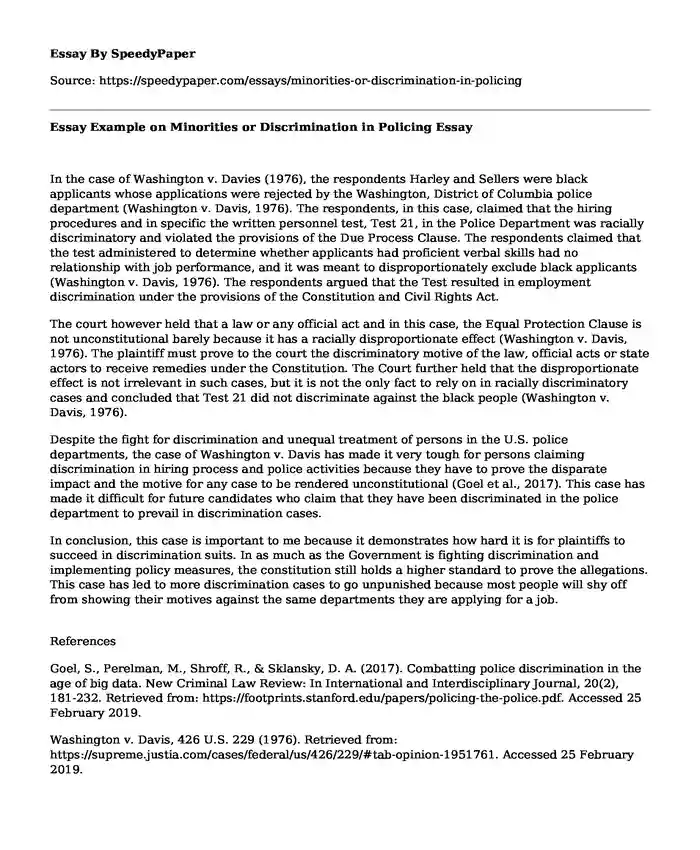
| Type of paper: | Essay |
| Categories: | Discrimination Justice Police Human rights |
| Pages: | 2 |
| Wordcount: | 434 words |
In the case of Washington v. Davies (1976), the respondents Harley and Sellers were black applicants whose applications were rejected by the Washington, District of Columbia police department (Washington v. Davis, 1976). The respondents, in this case, claimed that the hiring procedures and in specific the written personnel test, Test 21, in the Police Department was racially discriminatory and violated the provisions of the Due Process Clause. The respondents claimed that the test administered to determine whether applicants had proficient verbal skills had no relationship with job performance, and it was meant to disproportionately exclude black applicants (Washington v. Davis, 1976). The respondents argued that the Test resulted in employment discrimination under the provisions of the Constitution and Civil Rights Act.
The court however held that a law or any official act and in this case, the Equal Protection Clause is not unconstitutional barely because it has a racially disproportionate effect (Washington v. Davis, 1976). The plaintiff must prove to the court the discriminatory motive of the law, official acts or state actors to receive remedies under the Constitution. The Court further held that the disproportionate effect is not irrelevant in such cases, but it is not the only fact to rely on in racially discriminatory cases and concluded that Test 21 did not discriminate against the black people (Washington v. Davis, 1976).
Despite the fight for discrimination and unequal treatment of persons in the U.S. police departments, the case of Washington v. Davis has made it very tough for persons claiming discrimination in hiring process and police activities because they have to prove the disparate impact and the motive for any case to be rendered unconstitutional (Goel et al., 2017). This case has made it difficult for future candidates who claim that they have been discriminated in the police department to prevail in discrimination cases.
In conclusion, this case is important to me because it demonstrates how hard it is for plaintiffs to succeed in discrimination suits. In as much as the Government is fighting discrimination and implementing policy measures, the constitution still holds a higher standard to prove the allegations. This case has led to more discrimination cases to go unpunished because most people will shy off from showing their motives against the same departments they are applying for a job.
References
Goel, S., Perelman, M., Shroff, R., & Sklansky, D. A. (2017). Combatting police discrimination in the age of big data. New Criminal Law Review: In International and Interdisciplinary Journal, 20(2), 181-232. Retrieved from: https://footprints.stanford.edu/papers/policing-the-police.pdf. Accessed 25 February 2019.
Washington v. Davis, 426 U.S. 229 (1976). Retrieved from: https://supreme.justia.com/cases/federal/us/426/229/#tab-opinion-1951761. Accessed 25 February 2019.
Cite this page
Essay Example on Minorities or Discrimination in Policing. (2022, Nov 30). Retrieved from https://speedypaper.net/essays/minorities-or-discrimination-in-policing
Request Removal
If you are the original author of this essay and no longer wish to have it published on the SpeedyPaper website, please click below to request its removal:
- Free Essay Containing the Characteristics of a Good Student
- Use of Native American Mascots for Sports, Essay Example
- Evaluation of the Old Testament, Free Essay Sample
- The Technology Changes - Essay Example in HR Management
- Free Paper Sample with Some Questions on Sociology for Students
- Paper Example on Forensic Awareness in Modern Business Management
- Paper Example: SWOT Analysis - Real Estate Industry
Popular categories




